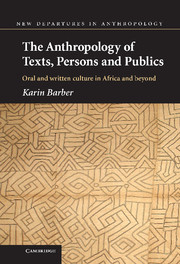2 - Genre, society and history
Published online by Cambridge University Press: 23 December 2009
Summary
All anthropological, sociological and historical approaches to texts need to have at their heart a concept of genre. A genre is a “kind”. It is a concept by which we group texts into categories or families. But unlike natural species, it is not a concept that can be operated wholly externally, by an objective observer alone: for the idea of genre is constitutive of the texts themselves. The conventions of a genre are tools or templates for giving specific forms to utterance. Genre orients a speaker's or writer's utterance towards a listener or reader; and it orients the listener or reader towards the text. The producer of a text operates in the expectation that the receiver will identify the genre and in turn bring the right kind of expectations to bear on it.
In literary criticism and comparative literary history, the study of genre is usually confined to those textual forms that are demarcated and canonised as “literature”, usually in conformity with a definition of literariness derived from classical and western models. In anthropology, it is more common to follow Bakhtin's lead and treat all types of utterance (which in Bakhtin's terminology included written texts) as being generated in accordance with recognised, shared conventions, and thus as constituting genres. Bakhtin spoke of the “little genres of everyday life” such as ordering a meal in a restaurant or conducting a phone conversation, and highlighted their continuity with larger, more enduring and generally recognised forms such as novels, or works of history or scientific monographs (cf Hanks 1996).
- Type
- Chapter
- Information
- The Anthropology of Texts, Persons and Publics , pp. 32 - 66Publisher: Cambridge University PressPrint publication year: 2007

